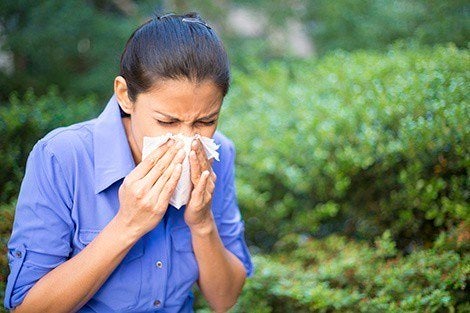For immediate release: February 18, 2015
Boston, MA – Allergies affect 30% of people around the world and asthma afflicts 10% of all children. Now, a new study has uncovered more than 30 genes that have strong effects on allergies, asthma, and Immunoglobulin E (IgE)—an antibody that triggers allergic responses. Among these genes are promising new potential drug targets for treating allergies and asthma.
The study appears online February 18, 2015 in the journal Nature. Liming Liang, assistant professor of statistical genetics at Harvard T.H. Chan School of Public Health, was lead author of the study.
The researchers—in the United States, the United Kingdom, Sweden and Canada—using a novel technique known as an epigenome-wide association study (EWAS)—also found that the genes are concentrated in eosinophils, a white cell that ignites inflammation in asthmatic airways. The genes indicate when the eosinophils are activated and primed to cause the most damage.
Therapies that neutralize eosinophils already exist, but they are very expensive and they only work for some asthma sufferers. The newly found eosinophil activation signals provide a possible means of directing treatments by predicting who will respond to medication.
The Freemasons’ Grand Charity, the Wellcome Trust, and grants from the Québec Government provided the principal funding for the study.
“An epigenome-wide association study of total serum immunoglobulin E concentration,” Liming Liang, Saffron A. G. Willis-Owen, Catherine Laprise, Kenny C. C. Wong, Gwyneth A. Davies, Thomas J. Hudson, Aristea Binia, Julian M. Hopkin, Ivana V. Yang, Elin Grundberg, Stephan Busche, Marie Hudson, Lars Rönnblom, Tomi M. Pastinen, David A. Schwartz, G. Mark Lathrop, Miriam F. Moffatt and William O. C. M. Cookson, Nature, online February 18, 2015, doi:10.1038/nature14125.
Visit the Harvard Chan website for the latest news, press releases, and multimedia offerings.
For more information:
Marge Dwyer
mhdwyer@hsph.harvard.edu
617-432-8416
photo: iStockphoto.com
###
Harvard T.H. Chan School of Public Health brings together dedicated experts from many disciplines to educate new generations of global health leaders and produce powerful ideas that improve the lives and health of people everywhere. As a community of leading scientists, educators, and students, we work together to take innovative ideas from the laboratory to people’s lives—not only making scientific breakthroughs, but also working to change individual behaviors, public policies, and health care practices. Each year, more than 400 faculty members at Harvard Chan teach 1,000-plus full-time students from around the world and train thousands more through online and executive education courses. Founded in 1913 as the Harvard-MIT School of Health Officers, the School is recognized as America’s oldest professional training program in public health.
